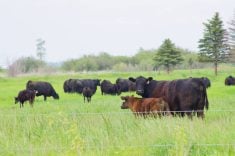EDMONTON — No one is more excited about the changes happening to Alberta Wheat Pool than its new president.
New world trade rules, a shifting prairie horizon, modern ways of doing business and increased co-operation among the three pools have enthused Alex Graham.
Under Graham’s leadership Alberta Pool will continue the changes it started six years ago under presidents Ray Schmitt and Doug Livingston.
Adjustments include fewer and bigger country elevators and an array of different farm services that will help the co-operative pare its costs.
Read Also

House ag committee to undertake several studies
The House of Commons standing agriculture committee has set its agenda for the coming months. Members began the fall sitting with a two-hour update on international trade
That means closing down a number of small points and amalgamating them into large, high-capacity buildings at central points. New facilities are planned for Camrose and Fahler that will do the work of a half-dozen old-style elevators.
Camrose will be the pool’s largest facility to date, offering a full range of services housing 20,000 to 30,000 tonnes of grain at a time.
“We’re having very significant success at the larger points. Will they (farmers) accept massive rationalization? I think only time will tell. We have to proceed cautiously and try them one at a time,” said Graham.
One of the complaints Graham hears from farmers is that the pool’s administration costs are too high. Shrinking farm income led the pool to hold its elevator tariffs at the same rate for four years and work is ongoing to reduce expenses at head office.
“We are trying to reduce the layers of management and we’re trying to flatten our organization down so that we can be competitive and take out unnecessary costs.
“I think that’s the reality of the 1990s,” Graham said.
With computers and modern communication links the pool can do more with less to get closer to farmers and their business partners.
Computerization on the farm is being investigated so the pool can link farmers directly to market information. Further efficiency may also be gained with more automation in country points and condominium grain storage.
Another idea is to buy application equipment and rent it to farmers so that the pool carries the cost of some of the machines used today.
Modern technology will also allow the three pools to amalgamate their services. Graham questions whether complete management teams are needed for terminal operations on the west coast.
He also wonders whether each pool needs to run its own computer system.
“We’re all tied into the Canadian Wheat Board, we’re all tied into XCAN, we’re all tied into the railways, so do we need those kinds of expenditures?
“We need to look at ways that we can be compatible with each other in a variety of ways.”
He suggests other joint ventures in canola crushing, flour mills and livestock operations.
The outside world is influencing some of the changes.
New world trade rules will help the pool set policy on contentious issues like the Western Grain Transportation Act.
“We’ve always said wait until the new GATT rules are there. … Now we have to figure out what is the way to deal with that,” he said.
Budget cuts at the provincial and federal government levels affect all taxpayers including farmers and businesses like the pool.
“We have some concerns about government cuts and what it means to us as an organization,” he said.
For example, when the province cuts transfer payments to municipalities, local taxes are raised on elevators and other pool facilities.
“What it’s going to do is cause a faster withdrawal from small rural communities because we’re not going to be able to be in 275 places any more,” he said.

















